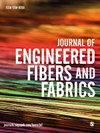A study on the effect of material type, structure tightness and finishing process on the physical and thermo-physiological properties of sandwich terry socks for winter wear
IF 2.3
4区 工程技术
Q1 MATERIALS SCIENCE, TEXTILES
引用次数: 1
Abstract
Compared to other textiles, socks are made at the lowest cost and have the highest consumption rate, making them one of the least-lasting fabric goods in the clothing industry. Socks are available in a wide range of fibers blends, that is, cotton, wool, nylon, acrylic, polyester, olefin, spandex, etc. As an element of footwear, socks act in tandem with the foot and shoe, influencing the temperature and moisture levels of the feet. The comfort of clothing next to the skin in terms of temperature and moisture is gaining more and more attention. Pilling is a serious issue with wool items, and less pilling is required since it negatively impacts the esthetic, comfort, and longevity of the fabric. This research has investigated socks pilling tendency and thermo-physiological comfort properties, that is, air permeability and thermal resistance made by wool/polypropylene blend yarn. Three different combinations of wool/polypropylene yarns on the main and platting side of the socks were used at two different tightness levels. Polyurethane finish has been applied to check the socks’ behavior after the finish application. Statistical analysis showed that finished samples knitted with wool/polypropylene as a main yarn offer the best results against the pilling test while sample code ANL, an unfinished sample, offers the best results regarding air permeability, thermal resistance, and overall moisture management capacity.研究了材料类型、结构密封性和整理工艺对夹心毛圈袜的物理和热生理性能的影响
与其他纺织品相比,袜子的制造成本最低,消耗率最高,使其成为服装行业中最不耐用的织物产品之一。袜子有多种纤维混纺,即棉、羊毛、尼龙、丙烯酸、聚酯、烯烃、氨纶等。作为鞋子的组成部分,袜子与脚和鞋子一起作用,影响脚的温度和湿度。衣服在温度和湿度方面的舒适性越来越受到人们的关注。起球是羊毛制品的一个严重问题,减少起球是必需的,因为它会对织物的美观、舒适度和使用寿命产生负面影响。研究了羊毛/聚丙烯混纺纱线的起球倾向和热生理舒适性能,即透气性和热阻性。三种不同的羊毛/聚丙烯纱线组合在袜子的主侧和镀侧,以两种不同的紧密程度使用。应用聚氨酯整理剂检查袜子整理后的性能。统计分析表明,以羊毛/聚丙烯为主要纱线编织的成品样品对起球测试的结果最好,而样品代码ANL(未完成样品)在透气性、耐热性和整体水分管理能力方面的结果最好。
本文章由计算机程序翻译,如有差异,请以英文原文为准。
求助全文
约1分钟内获得全文
求助全文
来源期刊

Journal of Engineered Fibers and Fabrics
工程技术-材料科学:纺织
CiteScore
5.00
自引率
6.90%
发文量
41
审稿时长
4 months
期刊介绍:
Journal of Engineered Fibers and Fabrics is a peer-reviewed, open access journal which aims to facilitate the rapid and wide dissemination of research in the engineering of textiles, clothing and fiber based structures.
 求助内容:
求助内容: 应助结果提醒方式:
应助结果提醒方式:


